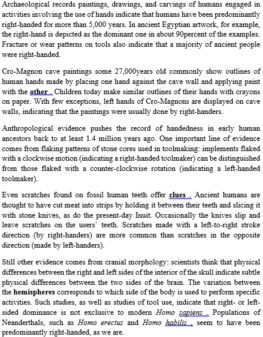Read the following passage and mark the letter A, B, C, or D on your answer sheet to indicate the correct answer to each of the questions from 28 to 35.
A generation gap in the workplace can make workers both young and old feel inferior, as well as hamper productivity and teamwork. Differences between generations can be seen in work ethics, habits and communication styles. Younger workers might fear not being taken seriously by their older colleagues, while older workers might fear that their experience is not valued but replaced by workers with knowledge of more current technology. However, members of each generation can close the gap between them if they're willing to meet one another halfway.
Older workers can show respect to the younger set by asking for their opinions and recognizing their contributions to the workplace as valid, or complimenting them on a job well done. Younger workers can show their elders respect by asking for advice on how to manage a situation with work, based on the older worker's many years of experience. It's important for both entry- and senior-level workers to see each other as equals, regardless of the type of position in which they work. No one wants to feel inferior or irrelevant just because of their age. Rather, a generation gap at work can be a learning opportunity.
Workers can also put themselves in their colleagues' shoes to determine what might be bothering them about their generational age difference. If a person is much older than another, perhaps it is bitterness about fewer job opportunities, or fear that a younger worker might seem more relevant and edge him out of his job. If workers open their minds to understand where co-workers are coming from, it can help ease any tension between them and appreciate each other's
work contributions.
If age seems to be a problem for someone at the workplace, it can be helpful to do the very opposite of what a co-worker might expect from someone of a different age set due to stereotypes. For example, if a worker is considerably younger such as right out of college, she can share researched information to indicate that she knows what she's doing, or show curiosity instead of upset to indicate emotional maturity if the person makes a disparaging remark about her youth. Older workers can maintain an enthusiastic attitude about work instead of showing boredom or bitterness from past experiences.
Workers can, moreover, directly address the concern of age differences at work with the colleague at odds with them by asking the person for constructive advice on how to handle the issue. For example, older workers who are unfamiliar with new software that younger colleagues understand might acknowledge to them that they did the same tasks differently in years past but show interest in learning the program to keep up with modern technology. Learning to speak their technological language can make them feel more connected. Likewise, a younger worker can admit to being green on the work scene, but eager to gain experience by learning from senior colleagues.
Each generation should respect the other generation at work to ______.
A. affirm their ability or personal experience they contribute to work.
B. express the recognition to the other’s position in the workplace.
C. make the other feel that they are necessary or useful in the workplace.
D. treat the other equally at work.




Đáp án C
Mỗi thế hệ nên kính trọng thế hệ còn lại trong công việc để _______.
A. khẳng định khả năng hoặc kinh nghiệm cá nhân mà họ đóng góp vào công việc.
B. thể hiện sự công nhận vị trí của thế hệ còn lại trong nơi làm việc.
C. khiến người khác cảm thấy rằng họ còn cần thiết hay có ích ở nơi làm việc.
D. đối xử bình đẳng với thế hệ kia trong công việc.
Căn cứ thông tin đoạn 2:
Older workers can show respect to the youngerset by asking for their opinions and recognizing their contributions to the workplace as valid, or complimenting them on a job well done. Younger workers can show their elders respect by asking for advice on how to manage a situation with work, based on the older worker's many years of experience. It's important for both 'entry- and senior-level workers to see each other as equals, regardless of the type of position in which they work. No one wants to feel inferior or irrelevant just because of their age. (Các công nhân lớn tuổi có thể thể hiện sự kính trọng với người trẻ bằng cách hỏi ý kiến họ và công nhận những đóng góp hợp lý ở nơi làm việc hay khen ngợi họ về một công việc được thực hiện tốt. Những công nhân trẻ hơn có thể tôn trọng người lớn hơn bằng cách hỏi sự tư vấn cách xử lý một tình huống ở công việc dựa trên kinh nghiệm nhiều năm của những người công nhân lớn tuổi. Điều quan trọng là cả công nhân mới vào nghề hay người có số năm lao động lâu hơn đều được đối xử công bằng, bất kể vị trí làm việc của họ là gì. Không ai muốn cảm thấy thua kém hay không phù hợp với công việc chỉ vì tuổi tác của họ.)